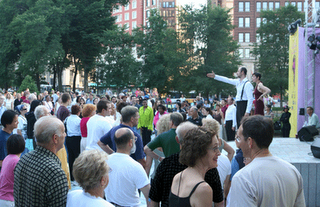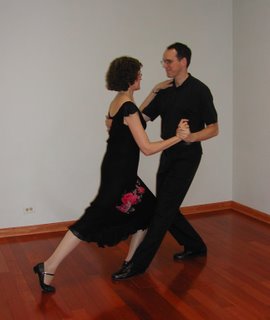Perichoresis
I recently encountered two words that theologians use to describe the unity of the Trinity: from Greek perichoresis and from Latin circumincession. They mean the same thing, that each Person of the Blessed Trinity lives in the other two, and they act with one accord and cannot be separated from each other, yet they remain distinct Persons.
Perichoresis literally means "dancing around", although it has perhaps become a theological term of art divorced from its origins. As an occasional social dancer, I hope it is not irreverent to still see in human dance some dim reflection of the Divine life. My own dancing is typically lead-footed and clumsy, but, once in a great while, the weights fall off, and with Rebecca, my friend and dance partner, we soar. There is joy in dancing as one, a small model of the exaltation and unity of the Ever-Blessed Trinity.
Years ago I read Chance or the Dance by Thomas Howard. As I recall, it contrasted the modern view of the world as a place of random, meaningless events with an older view of the world as a great dance, wherein we each have a part. I am reminded of both views when I think of a folk dance I once attended. From inside the dances, things looked chaotic, with lots of people wheeling around and going under each other's arms (the whirling energy was a big part of the fun). But of course there was a pattern to the dancing, and one only got into trouble when one left the pattern.
With Christ Jesus as our model, we learn our part in the dance of life, moved sometimes by the Holy Spirit, but other times by the zeitgeist or by our own stubborn will. Leaving the pattern, we may step on a few toes. We may even stumble and fall. If we do, the music still goes on, and the master of the dance waits for us to resume our part, training us with infinite patience and tremendous insistence, preparing us for our part in the great eternal dance, where the life and light and joy of the Father, Son and Holy Spirit fill the souls of the blessed.
The Council of Florence declared:
These three persons are one God, not three gods; for the three persons have one substance, one essence, one nature, one divinity, one immensity, one eternity. And everything is one where there is no distinction by relative opposition. Because of this unity, the Father is entirely in the Son and entirely in the Holy Spirit; the Son is entirely in the Father and entirely in the Holy Spirit; the Holy Spirit is entirely in the Father and entirely in the Son. None of the persons precedes any of the others in eternity, nor does any have greater immensity or greater power. From eternity, without beginning, the Son is from the Father; and from eternity and without beginning, the Holy Spirit has proceeded from the Father and the Son.' All that the Father is, and all that he has, he does not have from another, but of himself; he is the principle that has no principle. All that the Son is, and all that he has, he has from the Father; he is a principle from a principle. All that the Holy Spirit is and all that he has, he has from the Father and equally from the Son. Yet the Father and the Son are not two principles of the Holy Spirit, but one principle, just as the Father and the Son and the Holy Spirit are not three principles of creation, but one principle. Therefore, the holy Roman Church condemns, disapproves, anathematizes, and declares to be separated from the body of Christ, which is the Church, all who hold any contrary opinions.
(Relative opposition, or relation, is the opposition between two terms either of which needs the other to explain it. For example, the ideas of father and son, of double and half, of knowledge and the object known.)
Labels: consubstantialem, dance, friend, Holy Spirit, Holy Trinity, Rebecca



4 Comments:
Just saw your comment on my blog- Thanks! I have a copy of the Philokalia, but haven't opened it yet. So many books, so little time. You've inspired me to move it to the next on the stack.
Panthalassic E.
Thanks, Panthalassic E. I am gratified to hear I nudged you towards opening your copy of the Philokalia. The Philokalia is a terrific book for those who suspect they should be seeking perfection, especially for anyone who thinks he may already be doing fairly well.
The writings of the book were intended for serious minded monks of ages past, so modern, worldly types (like those who write in blogs) will almost certainly fall short of the standard this book sets. That means opportunities for improvement and drawing closer to our Lord.
An appealing aspect of the book is that it can be read in little snippets, as time permits.
By the way, your blog has influenced my reading list. Some of the Don Camillo books are available at my local public library, and I hope to read at least one this year. So many books, so little time.
Hmmm... the second paragraph above could be misread. It was intended as a self-accusation, not a comment on the sterling character of the author of the "an enemy hath done this" blog.
Sorry to see that your blog disappeared, Pathalassic Explorer, wherever you are. I read two of the Don Camillo books on your recommendation, and greatly enjoyed them.
Post a Comment
<< Home